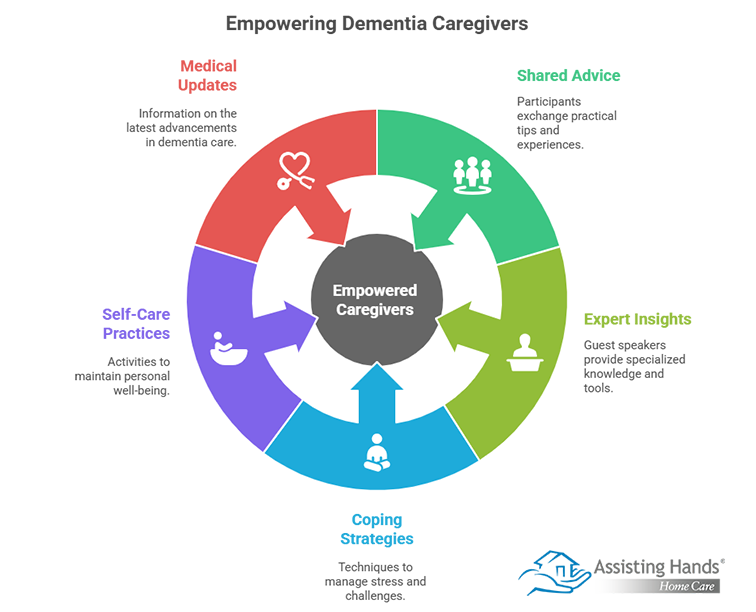
Table of Content
Caring for a senior loved one with dementia can be a challenging and emotional experience. Support groups offer caregivers and families a safe space to share experiences, access resources, and find solace in the company of others who truly understand their challenges. These networks play a critical role in reducing isolation and enhancing the quality of care.
Provide Emotional Support for Caregivers and Families
Caring for a loved one with dementia comes with a unique set of emotional challenges, including stress, anxiety, and feelings of isolation. Support groups provide a vital outlet for caregivers to express their emotions without fear of judgment.
By connecting with others in similar situations, caregivers gain a sense of solidarity and reassurance that their experiences aren’t uncommon. Hearing others share their challenges and triumphs can offer hope and practical advice, which helps caregivers feel less alone on their journey.
Caring for a loved one with dementia is a challenging task for anyone. The responsibilities can sometimes feel overwhelming, but help is available. Seniors can face a variety of age-related challenges. Though some families choose to take on the caregiving duties, there may come a time when they need a trusted senior home care provider. Families sometimes need respite from their duties so they can focus on their other responsibilities, and some seniors need around-the-clock assistance that their families are not able to provide. Assisting Hands Home Care is here to help.

Support groups serve as valuable information hubs where participants share advice, tips, and best practices for managing the complexities of dementia care. Discussions often cover topics like communicating effectively with someone with dementia, managing disruptive behaviors, and navigating legal or financial challenges.
Many groups also invite guest speakers or experts to provide insights and tools, such as coping strategies, self-care practices, and updates on medical advancements. These shared learnings empower caregivers to make more informed decisions and enhance their loved ones’ quality of life.
Reduce Stress and Prevent Caregiver Burnout
The constant responsibilities faced by dementia caregivers can lead to burnout, which affects both physical and mental wellbeing. Joining a support group can provide much-needed relief by offering a space to decompress and feel heard.
Caregivers are encouraged to find balance in their lives through discussions about self-care, time management, and setting boundaries. This support isn’t only beneficial for their health but also helps them maintain their ability to provide ongoing compassionate care.
Professional caregivers with training in dementia care can be a wonderful asset for seniors and their families. Not every senior has the same care needs, which means they don’t all need the same type of elder care. Cincinnati families can rely on Assisting Hands Home Care to provide individualized care plans to meet their elderly loved ones’ unique care needs. Our caregivers help seniors focus on healthy lifestyle habits such as eating nutritious foods, exercising regularly, and maintaining strong social ties, and we offer mentally stimulating activities that can boost cognitive health and delay the progress of dementia.
Build a Sense of Community
One of the most impactful benefits of dementia support groups is the sense of community they foster. These groups break down the isolation many caregivers face, connecting them with people who understand their realities more than anyone else.
Participants often form meaningful relationships with others in the group, providing an additional layer of comfort and camaraderie that transcends during tough times. This social connection can be a lifeline, offering caregivers both emotional support and practical resources to face their daily challenges head-on.
Access Resources and Advocacy
Support groups are often linked to larger organizations or networks dedicated to dementia care and advocacy. They provide participants with valuable resources, such as referrals to professional services, educational materials, and updates on policy changes or research developments.
By plugging caregivers into these resources, support groups empower them to become advocates for their loved ones and themselves. This access helps caregivers feel informed and confident when navigating the healthcare system or seeking additional assistance.
Even when families have the best intentions, caring for a senior loved one with dementia can be challenging. Fortunately, Assisting Hands Home Care is here to help. We are a leading provider of dementia care. Cincinnati families can take advantage of our flexible and customizable care plans, and our caregivers always stay up to date on the latest developments in senior care. If your loved one needs help with the challenges of aging, call one of our compassionate Care Managers today.





